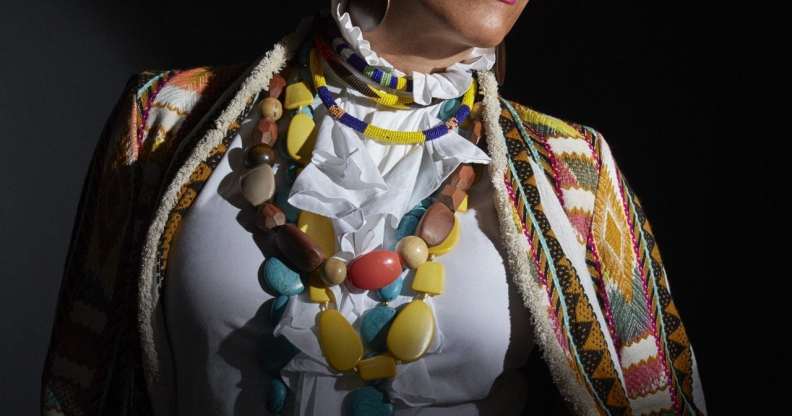Meet the photographer shining a light on queer, black identities

For photographer Lola Flash, there is “no separation between work and activism.”
Based in New York, Flash’s photography focuses on capturing queer, black identities and offers a “new way of seeing” some of the most marginalised members of society. She will be giving a talk about her work on Monday (July 23) at Autograph, a London art organisation dedicated to presenting art surrounding social justice and human rights.
“My work is not just about visibility, but also about raising the bar and exposing a reality that is not new, but has been highly overlooked,” she said in a statement to PinkNews.
Flash’s portrait subjects are often members of the LGBT+ community who have complex, intersectional identities. Her goal is to challenge stereotypes pertaining to gender, sexual, and racial issues.
“Photography continues to engage me in the process of making images of those that are deemed marginal. These images invite the eye to admire beauty that flourishes in life’s interstitial spaces.
“It is my aim to make us visible, in a way that we are not.”

Amanda, Cape Town, SA (Lola Flash, [sur]passing series)
“I started questioning and exploring race, by creating photographs where the course was totally reversed,” she said. “As an African-American person who grew up with the understanding that black was ‘bad’ and white was ‘good,’ I decided to initiate a different conversation—one where black was good.”

Robin (Lola Flash, LEGENDS series)
Flash’s work has mostly been set in big cities such as New York and London, where she attended graduate school at London College of Printing, and her photographs have been the centre of social and political movements—including the effort to heighten awareness during the HIV and AIDS crisis. She took part in demonstrations for the direct action campaign AIDS Coalition to Unleash Power (ACT UP) with a camera in her hands at all times.
“For me, there is no separation between my work and activism,” she said. “They are one, and each photograph is definitely a political statement, that then records history and says, ‘We were/are here!'”
Although Flash feels excluded by the art world because of the intersectionality of race, gender and sexuality presented in her portraits, she continues to push inclusion and visibility of ignored existences in photography.
“I don’t feel the need to judge other artists, but for me, my sole purpose is community service,” she said. “I need to be that person who elevates my people through my photogenic talents.”

Tiara, New York (Lola Flash, [sur]passing series)
The Autograph event follows Flash’s solo exhibition at the Pen + Brush gallery in New York earlier this year and her recent commission by Smithsonian magazine to photograph pioneering black women activists who reformed America’s segregated school system in the 1960s in a series of portraits entitled The Defiant Ones.
“Each portrait is like a word, for a writer, and together they weave a beautiful and epic story,” she said of the project.

